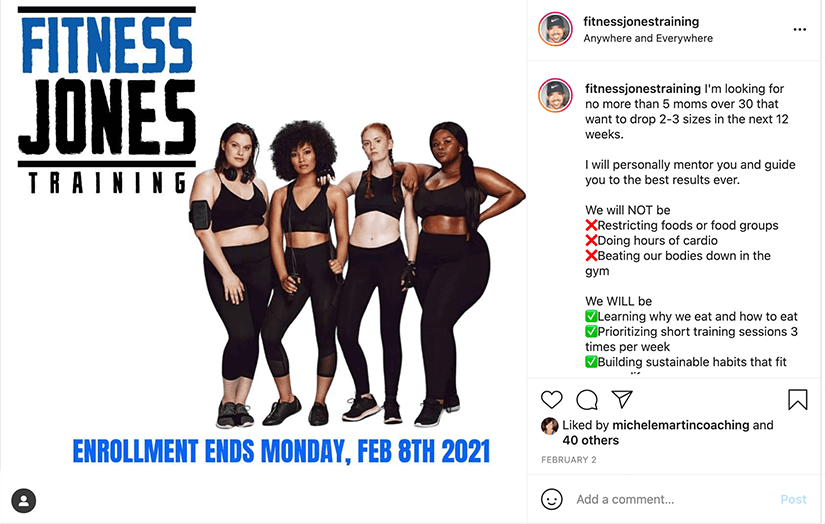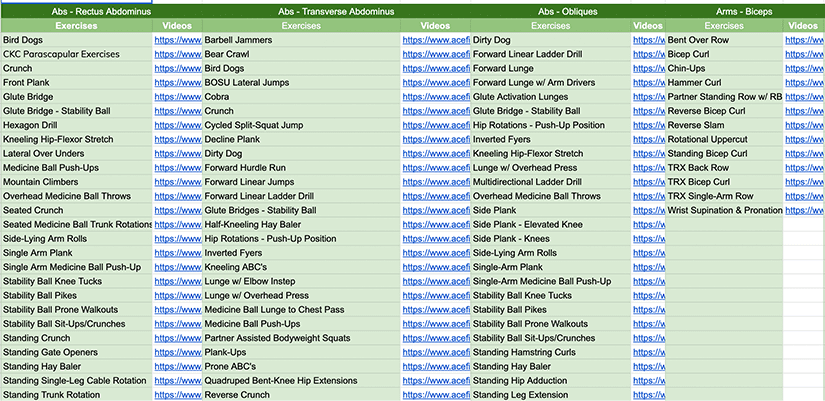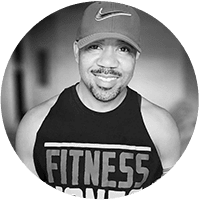This mission sounds impossible: Start an online coaching business in 24 hours.
I’m no Tom Cruise (I’m better-looking, for starters) but this is doable.
I have what I need: laptop, phone, internet connection, and my wits.
That and seven years in this industry.
Through my early trial and error, I learned firsthand what holds a new online trainer back:
- “There’s a lot of software to choose from and I don’t know where to start.”
- “I don’t know if anyone would buy that from me.”
- “How does online training even work?”
- “I don’t think I can do this.”
With hindsight, I know that quickly setting up your online business is possible.
1. Get over the pick-a-perfect-name thing.
Your business name is much less important than you think—and you can always change it later.
My choice, for example, was “Ren Jones Nutrition & Fitness.” Simple and to the point.
Over the years I switched to “Ren Jones Fitness” to “I’ve Got A Fitness Jones” to “Fitness Jones Training.”
Don't overthink this. Just pick something, and move on.
Picking a business name: 15 minutes
2. Choose just one social media platform.
Go with the social platform your audience uses.
In my case, I knew I wanted to reach moms over 30. I simply googled “social media platform demographics.” It turned out that Instagram was 57 percent female, so I built my main platform there.
However, if you already have a well-established social media presence, use whatever platform you’re already on or the one you’re familiar and comfortable with.
It’s a common error for new online coaches to neglect their existing following while setting up a business. There's no reason not to leverage the network you already have.
What should you post? Show your humanity. I started posting my authentic, transparent story about how I fell in love with fitness personally and why I started helping people professionally. I told the story of my mother’s life and death, and my sisters’ struggles.
Followers got to know me. If my story resonated, they became interested in hiring me.
Choosing a social media platform: 30 minutes
3. Get clients.
You’re not going to fill your schedule with personal training clients within 24 hours. But you are going to take a giant step toward that goal.
I used what we call a 5-1-60 hook. Here’s how it works:
- Announce limited availability (5 spots in your program).
- Ask for people who share 1 characteristic.
- Give a clear end date for the program (60 days).
- Include a specific result (like losing 5 to 10 pounds body fat).
- Stress that enrollment ends at a certain point (for example, next Sunday).
So here’s an example:
“I’m looking for 5 moms over 30 who want to lose 5-10 lb of body fat over the next 60 days. Enrollment ends next Sunday.”
Now paste that phrase in every caption of nearly every post on social media. Include a “call to action” like: Comment “interested” below and I’ll reach out to you to see if you qualify for the program.

When I first used the 5-1-60 concept, I landed four new clients within a week. Your results may vary. But you will get results.
For a detailed process on how to leverage this hook, consider signing up for the Founding Client Challenge, which guarantees you’ll get 1 to 5 online clients in 7 days.
Posting content: 30 to 60 minutes
4. Get paid.
Clients need a way to pay you. There are lots of cool apps and websites to help.
Again, don’t overthink. PayPal is simple, intuitive, reliable, and most people use it. No upfront money, and no costs until a client pays me (2.9 percent plus 30 cents per payment).
It has options to make your life easier: invoicing, recurring payments, and subscriptions.
- Invoices let you create one-time or repeat payment requests that you can send to clients manually, or on a regular basis. The client doesn't need a PayPal account to make payment. You can either email the invoice itself or send them a link to the invoice.
- Recurring payments is a no-fuss way to get paid. Clients go to a link to authorize their payment source and you can pull a payment each month with a simple click. Once you initiate that first payment, it stays authorized indefinitely.
- Subscriptions are like recurring payments but you don’t have to do anything to automatically withdraw funds. When the subscription runs out, it automatically cancels. This works great for any program that has a clear end date, like a 60- or 90-day program.
Everyone recognizes PayPal and trusts it. For me, that was the most important thing.
Setting up a PayPal account: 30 to 90 minutes
5. Deliver the goods.
This is where good trainers can get thrown off mission. We know how to coach and program and motivate—but we need a way to deliver this online.
And we can fall prey to “productive procrastination”: Going from one app to the next for months and months.
But we’re doing this in 24 hours, right? There’s a way: Keep it simple. Use apps you’re familiar with.
Your delivery system needs:
- a way for clients to track their measurements/progress
- a way to deliver your programs
For tracking, I set up an Excel spreadsheet and emailed it to clients.
All they had to do was measure at the belly button, chest, upper arm, neck, and thigh. Then they entered the numbers under the date and emailed it back to me.
There may be a better option now: Google Docs. That way there’s no emailing and you can both look at results in real time.
In fact, you can deliver your whole program—including workouts, habit tracking, nutrition tracking, whatever—via Google Docs.
I suggest creating a program delivery template in Google Sheets, or steal this one:

Need a program delivery template? Online Trainer Academy Level 1 program director Amber Reynolds created this one for a student. She'd love for you to have it too.
Download your free done-for-you program delivery template.
(To make a copy you can customize, click the link, go to File, and select Make a copy.)
Another app I like for delivering programs: YouTube.
YouTube is packed with exercise videos, and everyone knows how to “use” it (um, click “play”).
You can create a playlist of moves, assign a link to it, and send a whole workout (or series of workouts) to clients.
I did this and didn’t have to record a single video of my own. It was like having a team of trainers to help me.
But wait, you say—won’t clients complain that it’s not me in the videos? The answer is a resounding “no.”
Clients don’t have anything to compare to in terms of online coaching, and if you’re an Online Trainer Academy graduate you are giving better service than probably 90 percent of the online coaches out there.
This is a great way to get started, but as the weeks go on, you can start to record your own exercise videos. Put your own stamp on them, with tips and cues and encouragement that you know will work for your audience.
Setting up a spreadsheet in Excel or Google docs: 60 to 90 minutes
Setting up YouTube playlists: 60 to 90 minutes
6. Set up your support system.
Look—we’re almost done and it isn’t even dinnertime. But this last part is important.
You need to have a way to communicate with clients to answer questions, give insight, and keep them on task.
I used to burn a ton of time just on phone calls with clients. Not anymore.
You can do what I do now: Set up a Google Voice account on your cellphone.
Google Voice is an app for adding an additional phone line to your existing account.
If clients need to text me or set up a call, that’s the number we use.
This way I can manage my coaching availability while still being available to my family and friends.
I talked to each client once per week to check in with them, and they were free to email me any other time, but I had set times per day for when I would reply.
You can also achieve similar efficiencies by using WhatsApp, giving yourself an entirely separate way to use your phone for texts, calls, and video.
Setting up client communications: 30 minutes
You’re done! We set up your fitness business in about eight hours—even less if you’re tech-savvy. Hardly an impossible mission.
Let’s grab a bite.
This article will self-destruct in 5 seconds.










